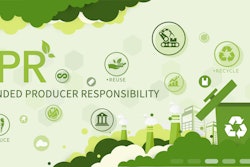A consortium of Italian packaging industry groups focused on creating a set of shared principles around the conscientious design, production, and use of packaging introduced its charter at the Ipack-Ima event held in Milan, Italy, in May. Members of The Ethical Packaging Charter include Italian packaging trade publisher Edizioni Dativo s.r.l., the Italian Institute of Packaging, Ipack-Ima, and packaging suppliers SIT Group, Sun Chemical, and BoxMarche.
Reads the charter, “The Ethical Packaging Charter wishes to be a tool of commitment, a set of shared principles to help accompany packaging towards a future of greater awareness. The Ethical Packaging Charterwishes to associate duties and rights, that bind the moment of production to that of use and consumption: an ideal contract for the system’s stakeholders, so that they might commit themselves to a set of shared principles and by making this choice public.”
Explained Luciana Guidotti of Edizioni Dativo, the charter is designed to be a tool for brand owners to help educate consumers on the important roles of packaging, allowing for more transparency.
The 10 principles of the charter, in brief, are as follows (verbatim from materials distributed at the show):
1.Responsible: Responsible packaging is the bearer of quality that combines environmental protection with respect for the needs of all users.
2. Balanced: Packaging is balanced when it has been devised and designed in the right relation to its contents and it is the result of what is needed for its correct dissemination.
3. Safe: Safe packaging fully accounts for its traceability, throughout the supply chain; it is safe in terms of the protection of its contents and the non contamination of the same, safe during transport, the same as during its use and through its entire lifecycle.
4. Accessible: Packaging is accessible when it is simple and easy to use, and thus considers the right of any consumer to be able to approach, understand, and use a product.
5. Transparent: Packaging is transparent when it is sincere, when it tells the truth in full respect of legal standards and it does so plainly. Via the quality of transparency, it manages to build up a relationship of trust with the recipient.
6. Informative: Informative packaging respects legal standards, bears all information useful to know about the contents and its packaging, their use and disposal.
7. Up-to-date: Packaging reflects the culture of our society and in turn contributes to creating the same. It does so via messages that are transmitted via its shape, its graphics, its symbols: it thus transfers values and messages and takes part in the evolution of contemporary social life.
8. Forward-looking: Packaging is capable of intervening today in terms of possible future effects. The choices that determine the packaging of today cannot develop starting from an immediate advantage but must consider the consequences that derive from the initial choices.





















